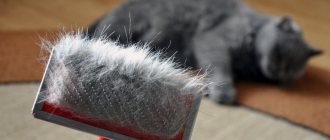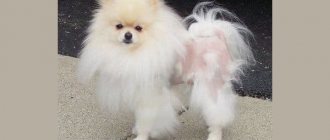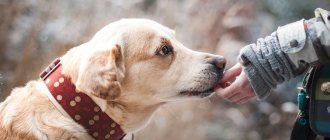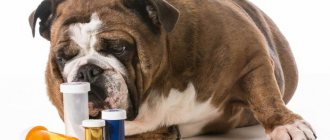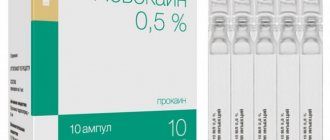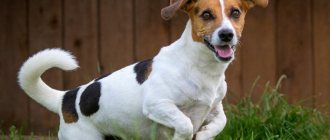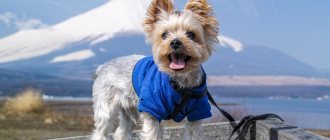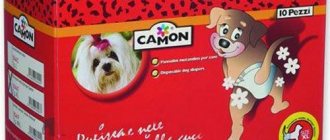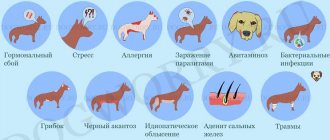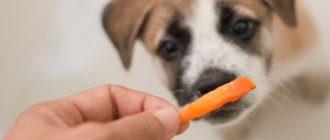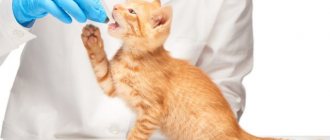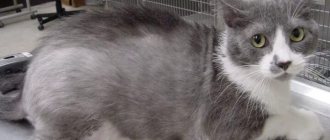Hair loss: normal or pathological
Many dog breeds experience a seasonal coat change, which is normal. It should not cause concern for the health of the pet, as this is a natural process. Molting occurs twice a year. There is also “baby shedding,” which occurs in puppies between the ages of 3 and 9 months. During this period, delicate fluff falls out, and in its place, tougher, adult hair grows.
But if hair loss drags on and occurs too intensely, then this is a reason to consult a veterinarian. Coat problems can occur for a number of reasons. These include:
- unbalanced diet (deficiency of vitamins and minerals);
- improper grooming;
- infection with a fungal or parasitic disease;
- helminthiases;
- allergic reactions;
- stress (for example, when another pet appears in the house);
- taking hormonal medications;
- acute and chronic diseases, including hereditary ones;
One of the signs of serious diseases is focal hair loss while it persists in other areas.
To help your pet you need to find out the cause of the problem and begin to fight it.
When is the best time to take vitamins for dogs?
Typically, dog foods are balanced formulations. They contain daily doses of all the necessary substances for the pet’s body. As a rule, these are premium feeds and holistic products. Cheaper foods are less enriched with vitamins and minerals.
Eating natural foods saturates the dog’s body with minerals. But vitamins for dogs against hair loss should be included in the menu, at least periodically:
- After the molting period. The dog sheds 2 times a year: in spring and autumn. If hair loss lasts more than 5 weeks, you should consult a veterinarian to prescribe vitamins and supplements to prevent vitamin deficiency and serious diseases. They “feed” with additives pets that are fed natural products or budget food. This way, the fur will recover faster;
- Before exhibitions, if the dog owner wants the pet’s hair to look more impressive and shiny;
- With constant stress and a change of residence, the condition of the coat also changes. The fur becomes dull and begins to fall out. For a speedy recovery, it is necessary to consume vitamin complexes;
- An increase in the need for vitamins and minerals occurs in pregnant and lactating dogs.
source
Other coat problems
Active hair loss in dogs is not the only problem that owners face. Shedding may occur within normal limits, but the fur itself looks dry, dull, and disheveled, which also requires consultation with a specialist and taking appropriate measures. Under no circumstances should symptoms such as itching, dry skin, and flaking be ignored.
What vitamins are needed to avoid skin problems?
Separately, it is worth mentioning problems with the dog’s skin. In most cases, skin and coat problems are interrelated, but it is better to be able to deal with each problem separately, so that you can then offer your pet comprehensive treatment. So, skin diseases are most often caused by a lack of vitamins A and B, and they include dermatitis, scabies, ringworm and pyodermatosis. As you can see, the problems can be more than serious, so you also need to take them seriously. If you properly monitor the condition of your pet’s fur and skin, you will be able to quickly and promptly notice the occurrence of certain problems. Then you can quickly contact a veterinarian and get a full consultation. But if you don’t want your pet’s skin to reach a state where you have to take him to the doctor, then you should make sure that he receives the necessary vitamins and minerals. And, of course, it is necessary to properly care for your pet, wash it with appropriate products, not give it harmful food, and so on.
What vitamins are important for a dog's health?
For normal growth and full development of a dog, vitamins must be supplied to its body along with food. Many of them, in addition to the general effect on organs and systems, have an additional effect on the animal’s fur.
Vitamin A.
Retinol is involved in the synthesis of collagen fibers, keratin and elastane. With a lack of this vitamin, the elasticity and silkiness of the coat is lost, and fragility is observed.
B vitamins.
These vitamins normalize the functioning of the sebaceous glands and are important in the fight against flaking of the skin. They are necessary to nourish the bulbs so that the coat is elastic. With a sufficient amount of B vitamins, hair loss is reduced, the undercoat grows, and hair fragility is eliminated.
Vitamin C.
Vitamin for maintaining the body's protective functions, helps resist infectious diseases and related complications.
Vitamin D
Indispensable for proper absorption of calcium and phosphorus. If it is deficient, your pet may experience problems with the musculoskeletal system.
Vitamin E.
Responsible for the normal functioning of the reproductive system, and it is also a powerful antioxidant.
Vitamins F and H.
Participate in the synthesis of keratin and are necessary for maintaining healthy skin, claws and coat.
How to choose vitamins for dog fur
The best vitamin complexes can quickly bring your pet’s appearance to ideal condition. To achieve the desired effect, when choosing supplements, it is important to pay attention not only to the breed, size of the dog and its state of health, but also to the composition of the supplement, as well as the reputation of the manufacturer. Dog owners willingly buy products from 8in1, Beaphar and other well-known companies, because they have repeatedly been convinced of their effectiveness.
Fatty acids and minerals
In addition to vitamins, the following minerals and fatty acids are also important for a dog's body.
Omega-3 and omega-6.
The importance of these substances for the body is difficult to overestimate. In addition, they give the coat a healthy shine and elasticity, can enhance pigmentation, and accelerate the restoration of the coat after illness.
Zinc.
This element supports normal thyroid function. Zinc is also associated with vitamin A: together they help reduce thinning guard hairs, hair loss and fragility.
Sulfur.
It is necessary to optimize the production of sebum by the skin glands. Sulfur is important for hair shaft proteins at the molecular level. Sulfur compounds form sulfide bridges.
Calcium and phosphorus.
Together with vitamin D, they support many processes in the body.
Manganese.
It is involved in the synthesis of keratin.
Copper.
With a deficiency of this substance, collagen formation is disrupted and healthy coat color is lost.
Selenium
. In its effect on the dog's body, selenium is similar to vitamin E. In addition, they work together. They have antioxidant properties, support the immune system, and help relieve stress.
Iron
. Lack of iron can cause anemia and other dangerous conditions.
Features of vitamin-mineral complexes
Natural food is good for your dog's health if it is properly balanced. However, doing this at home is quite difficult. You need to calculate the daily portion of meat (certain varieties), vegetables and other products. If a dog owner does not have the ability or knowledge to prepare a balanced diet, this may result in a lack of certain substances in the body. Modern high-quality feeds already contain the necessary components and their balance is maintained according to average statistical needs. But in some cases, to maintain the health of the dog, improve the coat and eliminate intense shedding, it is necessary to use special complexes with vitamins. Their selection is very large. They may differ in release form (tablets, capsules, drops, injection solutions), composition (combination of active substances) and dosage. Your doctor will help you choose certain vitamins for hair growth in dogs.
Vitamin preparations
Isidivit®.
Emulsion for injection, designed to increase the body's natural resistance, maintain immunity, normalize metabolism and other functions. Prescribed by a veterinarian for sick and weakened animals. Aisidivit® belongs to complex immunostimulating drugs. It contains ASD 2-F substance, vitamins A and E, and succinic acid.
"VitOkey."
A drug developed for the prevention and treatment of hypovitaminosis, as well as diseases that can develop against their background. It can be prescribed as part of complex therapy for stress, poisoning, invasive diseases and diseases of non-contagious etiology. The product is available for parenteral administration (by injection). "VitOkey" contains a complex of essential vitamins in a physiologically based ratio: A, D3, E, K, B1, B2, B6, nicotinamide, calcium pantothenate, cyanocobalamin, folic acid, biotin. The multicomponent composition makes the drug especially effective in cases of deficiency of several vitamins at once, which is often found in infectious and invasive diseases, massive blood loss and severe injuries.
"Vittri-1".
This is an oil solution of vitamins A, D3, E, which are in physiologically reasonable proportions. "Vittri-1" refers to combined vitamin preparations. It is suitable for the prevention and complex treatment of hypovitaminosis, xerophthalmia, rickets, osteomalacia, some dermatitis, poorly healing wounds and ulcers, inflammation of the mucous membranes in combination with the main therapy. The drug helps normalize metabolism. It is distinguished by convenient packaging, ease of use (for oral administration it is mixed with food) and storage. The drug is compatible with other medicines and feed.
"Vittri-3".
A combined vitamin preparation in the form of an oil solution of vitamins A, D3, E. According to recommendations for use and effect, it is similar to Vittri-1. The difference lies in the method of application. Vittri-3 is administered subcutaneously or intramuscularly. Prescribed to animals with reduced or absent appetite, with serious diseases and disorders, when the feed form is not effective enough.
"Bone."
This is a mineral and vitamin supplement for dogs, which contains vitamins, macro- and microelements, and biologically active substances. The basis of the product is high-quality bone meal. The supplement is made from environmentally friendly raw materials and does not contain preservatives or dyes. It is used to prevent mineral and vitamin deficiency and has a general beneficial effect on the animal’s body. The “Kostochka” series includes 6 products: with brewer’s yeast, with seaweed, with succinic acid, as well as “Kostochka vitamin”, “Kostochka immunovit” and “Kostochka multivitamin”. As vitamins for dog fur, we can separately recommend “Bone with Brewer’s Yeast.” It promotes wool growth and improves its structure. In addition, “Bone with seaweed” can be recommended. Its active substances promote hair growth and enhance the intensity of its color.
Radostin®.
This is a combined preparation containing vitamins, macro- and microelements in a balanced, physiologically based ratio. To avoid unwanted interactions, microelements in Radostin are contained in chelate form, and vitamins are in microcapsule form. This form also ensures the best bioavailability of active substances. Radostin® contains:
- vitamins A, B1, B2, B3, provitamin B5, B6, B12, C, D3, E, H;
- iron, potassium, calcium glycerophosphate, manganese, copper, selenium, zinc;
- "Bio-Mos" (mannanoligosaccharides);
- raspberry leaf, mussel hydrolysate, chitosan succinate, spirulina, taurine (according to the recipe);
- auxiliary components.
There are 3 products in the series: for adult dogs, for puppies aged 21 days to 18 months, for dogs over 6 years old. The active substances they contain, among other things, help improve the condition of the skin and coat.
"Sulfur".
This feed additive, produced in powder form, contains sulfur - one of the components of the protein molecule, which is actively involved in metabolic processes and the construction of cellular structures of the body. Among other things, sulfur is involved in the synthesis of collagen and keratin. The supplement helps normalize metabolism, improve the condition of skin and coat, accelerate hair growth (especially during molting), improve pigmentation, and add shine. “Sulfur” can be used to prevent diseases of the skin and coat, prevent hair fragility and the appearance of dandruff. The additive is mixed with food in the recommended dose.
When choosing vitamins for dogs against hair loss, you should understand that no drugs will help if the cause is not a lack of substances, but a disease. Therefore, in case of non-physiological hair loss, first contact your veterinarian.
Vitamins for Yorkies
If there is a deficiency of vitamins in the body of Yorkshire Terriers, then very often the cause is poor nutrition. A long-term lack of vitamins in Yorkies' diet causes very specific syndromes called vitamin deficiencies. Among all vitamins, there are two types: fat-soluble (A, D, E, K) and water-soluble (C and B complex vitamins). When taken in excess quantities, especially in the form of pharmaceuticals, they can lead to symptoms of poisoning (overdoses of vitamins A and D are known).
